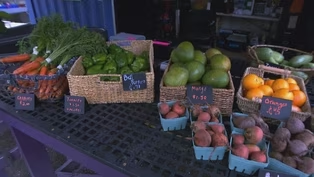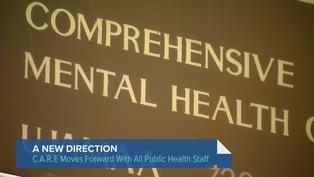Chicago Tonight: Black Voices
Author Explores Hidden History of Black Civil Rights
Clip: 10/2/2024 | 8m 34sVideo has Closed Captions
Dylan Penningroth wrote "Before the Movement: The Hidden History of Black Civil Rights."
In "Before the Movement: The Hidden History of Black Civil Rights," author Dylan Penningroth takes readers off the beaten path to explore a hidden civil rights history that dates back to the 1830s.
Problems playing video? | Closed Captioning Feedback
Problems playing video? | Closed Captioning Feedback
Chicago Tonight: Black Voices is a local public television program presented by WTTW
Chicago Tonight: Black Voices
Author Explores Hidden History of Black Civil Rights
Clip: 10/2/2024 | 8m 34sVideo has Closed Captions
In "Before the Movement: The Hidden History of Black Civil Rights," author Dylan Penningroth takes readers off the beaten path to explore a hidden civil rights history that dates back to the 1830s.
Problems playing video? | Closed Captioning Feedback
How to Watch Chicago Tonight: Black Voices
Chicago Tonight: Black Voices is available to stream on pbs.org and the free PBS App, available on iPhone, Apple TV, Android TV, Android smartphones, Amazon Fire TV, Amazon Fire Tablet, Roku, Samsung Smart TV, and Vizio.
Providing Support for PBS.org
Learn Moreabout PBS online sponsorshipAfrican-americans were fighting for their rights through common law long before what we think of as the civil rights movement.
>> That's the conclusion.
Author Dylan pending Rauf came to after rummaging through county courthouse is in interviewing plenty of black Americans to explore civil rights story dating back to the 18 30's.
His book is called before the movement.
The hidden history of black civil rights and author Dylan pending Roth joins us now.
He is a professor of law and history at UC Berkeley and we'll be sharing this book with audiences at the Chicago Humanities Festival.
Thank you so much for joining us.
Thank you for having So you open this book with a family story that raises the question for you and like you to write this book.
What was that story?
>> It's a story of my great, great, great uncle Jackson Holcomb.
He was an enslaved man in Southside Virginia.
a place that I visited often when I was a small child.
There's a recording of my great, great uncle Thomas Holcomb talking about Jackson Hole coming on the tape.
He says the Jackson hole come while he was a slave, had a boat and in that boat during the closing days of the Civil War, when Confederate soldiers are running all through the woods, desperate for a ride across the Appendix River.
He gave them a ride.
And when they got to the other side, they paid him.
And I felt myself, they paid him real And I thought to myself, why would a bunch of heavily armed white men who are fighting to preserve slavery?
Pay a black man money who is in slavery without so much as a second thought.
And that's the question that began me on this journey toward the book.
I have so many questions about that story alone.
But I know, you know, we talk about in the book because not only.
>> You know, why they why were those Confederate soldiers willing to pay a man who was a slave?
But also the man who was a slave owned the boats and was in a position to receive money.
From Confederate soldiers from men who wanted to maintain his enslavement absolutely.
And I think that the important thing to recognize here, the point thing to notice is that >> they didn't think about it was so casual so taken for granted.
I think that's a clue.
The clue is that white people in the south in 18 65.
They were used to making deals with black people who are in slavery.
They were used to seeing black people on boats, cows, horses, chickens, things like that.
Black people like my great, great uncle Jackson.
Holcomb didn't have rights to those boats.
They didn't have civil rights, but they had privileges that were so widely understood.
By white southerners and they were part of the same legal system.
The same system of understandings that white southerners generally respected them unless there was something on toward happening.
So it's routine this of that interaction that I think is most interesting to me.
That means that when civil rights come.
That transition is a turning point in some ways.
But in other ways, it's not so much of turning point at all.
>> The premise of this book, it seems to be, you know, sort of about the history that may have been forgotten about how blacks engage with the law.
Well, before the civil rights movement that we know of, you know, over the course of the 400 years that we've been a part of this country.
What is that history that that's been forgotten?
>> So I think typically when we think of civil rights when I think of civil rights, I think of Martin Luther King, the march on Washington, I think of Rosa Parks and the Montgomery bus boycott.
It turns out that Martin Luther King, Rosa Parks, they are the heirs to 150 year long tradition of black people using thinking about and talking about civil rights, but they're not the civil rights that you see in the Civil Rights act of 1964, they're not about discrimination on the basis of race, Other categories there about the right to own property, the right to make contracts the right to go to Those are actually the original civil rights that are written into America's first national civil rights law.
Civil Rights act of 18, 66.
And so it's that tradition of black people using those civil rights that actually forms the foundation for the civil rights movement that we know so well.
>> You mentioned, you know that it was just sort of not necessarily taken for granted, but like whites were would use to regularly engaging in sort of making these contracts and deals with with black enslaved or freed at the time.
What was sort of engagement response or reaction to to making the sort of contracts and blacks, you know, going about their everyday lives.
Really?
Yeah, it's a really interesting question.
Why would white people I would wait Southern is in place like Mississippi, your Southside Virginia.
Why would they?
>> Allow counts.
Black people having civil rights.
And the answer is that it was in their interest.
And this actually is something barring from the great critical race theory Derrick Bell.
He had this theory of interest convergence.
That is to say that black people's rights will be advanced if and only if it also is in the interests of white people.
And you see this over and over again in my records.
If you think about what is a share cropping contract, it's a way of exploiting black people, not in spite of law, but through law.
They needed black people to have civil rights.
>> To do all this and all this research because we're going back several 100 years here.
You had to get off the beaten path.
As we said, you had to dig through some some court houses and some basements of some black people that you dig around in their basements.
What did you find in all of this?
Because the thing also fascinated by is that the these records still exist.
>> it is kind of amazing that they still exist.
A part of the reason is that they're considered by law to be permanent records.
And so in the states, the county courthouse is what I do is I would drive around get a rental car and I go to the courthouse and asked the clerk of the deputy clerk for permission to go in the back and is often is not.
They said fine.
No problem.
Also, what do you want back there?
We want hear exactly because, you know, they're ready traffic taking yes, actually, sometimes I got to talking with them.
And really interesting to talk with, but that what you find in the back there is number one, how often black people were actually in these court houses.
So it's often serve an impression that we get that black people came to court came into their rights for the very first time in the 1950's.
But in fact, they were there all along.
They just weren't arguing against discrimination.
And then the second thing that you find in there is stories.
These stories are stories that you can almost not get from any other source.
Their stories about black people's interior lives.
They're loved.
They're they're annoyances, their pettiness sometimes.
And these are really rich and deeply human stories.
That's the kind of thing that I was interested in finding in the courthouse and they are such precious documents of our nation's history.
Part 4 of your books dedicated to the movement era and in Chapter 11, you detail the importance, of course, of the Brown versus Board of Education ruling.
>> What did your research reveal about Thurgood Marshall's strategy in that case?
South are good Marshall.
It's really interesting.
Thurgood Marshall is considered today a civil rights lawyer right?
>> But most of the time, what lawyers like him tended to do was vague to property cases that to contract cases they represented churches.
That's the way that they had to pay the Bills.
Brown versus Board of Education, the remedy that they were seeking was an injunction ordering the Topeka School board to admit Linda Brown.
There was no money in it for him and to this day, civil rights lawyers have to face this dilemma.
They are engaged an enterprise that doesn't really pay and so often keep the lights on, they have to handle also the other kinds of things which actually turn out to be the kinds of things that black people in 1919, 50 cared about very deeply.
That is the everyday civil rights but their access to properties to their home ownership, their marriage contract.
Exactly.
So if you think about the church.
>> That Martin Luther King, that Dexter Avenue Baptist Church, it's a corporation.
The Montgomery boycott 1956.
They form a corporation.
Martin Luther King is the president that allows them to bring in money.
The people who are driving the car in Dylan.
We do want to give everybody to read the book.
You want to give it all away because we're actually gonna time.
Dylan pulling Dylan hitting rough.
Thank you again for joining us.
We appreciate it.
>> Again, the book is called before the movement.
The hidden history of black civil
Austin Residents Get a Lesson in Urban Farming
Video has Closed Captions
Clip: 10/2/2024 | 2m 44s | A nonprofit is showing off Austin's green spaces, one trolley stop at a time. (2m 44s)
Improving Mental Health Care Access on the South, West Sides
Video has Closed Captions
Clip: 10/2/2024 | 9m 5s | Advocates say there's still much work to be done. (9m 5s)
Providing Support for PBS.org
Learn Moreabout PBS online sponsorship
- News and Public Affairs

Top journalists deliver compelling original analysis of the hour's headlines.

- News and Public Affairs

FRONTLINE is investigative journalism that questions, explains and changes our world.












Support for PBS provided by:
Chicago Tonight: Black Voices is a local public television program presented by WTTW

